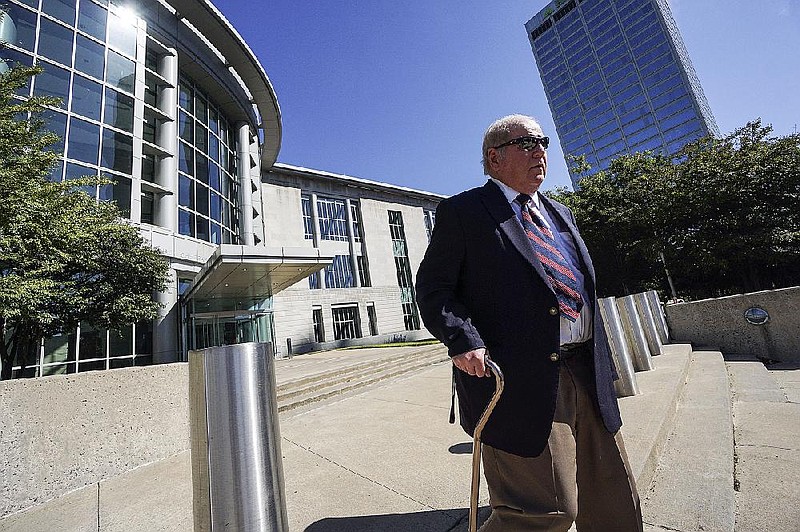CLARENDON -- Former Judge Joseph Boeckmann Jr. sat with his cane at his side before Circuit Court Judge E. Dion Wilson on Wednesday in the same judicial circuit where he once presided as his defense attorney argued Boeckmann has judicial immunity and therefore is protected from being sued over allegations that he used his power to coerce men, including minors, into sexual acts.
The floors of the empty Monroe County courtroom, located in this Delta town with a population of fewer than 2,000, creaked as defense attorney Jeff Rosenzweig and Joshua Gillispie, attorney for the plaintiffs, argued over judicial immunity that could eventually end up before the Arkansas Supreme Court.
Boeckmann, a former Cross County District Court judge, was sentenced in federal court in 2018 to five years in prison after pleading guilty to wire fraud and witness tampering. The convictions stemmed from state and federal investigations into claims he forced men as young as 16 to pose nude or lewd for him as a form of community service.
The former judge, now in his 70s, was recently released from prison but remains under supervision, Rosenzweig said Thursday.
The suit claims a minor with a traffic violation had his charge dismissed in exchange for community service. It says the service included the defendant bending over and picking up cans as Boeckmann took photographs of the minor from behind. Another plaintiff posed nude and was groped by Boeckmann, and in return was paid or had charges dismissed, the suit says.
A third plaintiff posed for Boeckmann nude and clothed in exchange for money after appearing before the judge for a misdemeanor in 2010, and a fourth was told by the judge while in court to pick up cans and bring them to his residence, the suit says. Once there, the former judge asked the plaintiff to bend over and pick the cans up while Boeckmann photographed the actions, it says.
"Aren't you glad you didn't have to pay that $500?" the suit claims Boeckmann told the plaintiff.
A grand jury heard statements from six individuals who made similar claims during Boeckmann's trial, which received national attention. State judicial officials, at the time, said it is likely Boeckmann victimized many more young men than those willing to testify.
It was previously reported that an FBI agent testified Cross County District Court records for 2014 found Boeckmann was the only judge to assign community service. Out of the 82 people assigned community service, 66 were white or Hispanic men between the ages of 15 and 35.
The civil suit, filed in June 2016, claims the plaintiffs have suffered losses and damages in an amount excess of any minimum requirement for federal court jurisdiction in diversity of citizenship cases. Less than a month after the complaint was filed, Rosenzweig filed a motion to dismiss on judicial immunity, statute of limitations and subject matter jurisdiction.
Rosenzwieg claimed during a phone call Thursday that he believes judicial immunity is quite broad and includes the acts of his client.
"It all came about as a result of the probation and community service done by the court," Rosenzwieg said. He argues that because the community service was an act of the court, it makes his client immune.
Gillispie doesn't see it that way.
"This lawsuit alleges that Boeckmann used his power as a judge to coerce young men into granting him sexual favors outside of the courtroom including taking nude photos of them or lewd photos of them and other sex-related things," Gillispie said. "Is that a judicial act? Is that something that a judge normally would do? Is that something a judge is expected to be performing?
"If the answer is no, then there is no judicial immunity."
Joshua Silverstein, a professor at UALR William H. Bowen School of Law, said Thursday that judicial immunity is a doctrine to prevent judges from being sued for doing things within the scope of their judicial role.
"We don't want every defendant or plaintiff suing the judge," Silverstein said. "If the parties could sue judges instead of appealing, it would be a way for plaintiffs and defendants to bring the judicial system to a halt."
A judge could make a ruling or issue an order that is egregiously wrong and someone could complain or appeal but be unable to sue, he said.
"Sexually harassing parties that come before the court is not a part of the judicial role," Silverstein said. "You can argue to the Supreme Court all you like."
There are gray areas, Silverstein said. For example, a judge could possibly make degrading comments to a female attorney in the courtroom and, while improper, there is an argument it was done within the judicial role, he said.
"When a judge is manipulating the system for personal gain, you don't have judicial immunity," Silverstein said. "You don't have immunity from taking a bribe."
Wilson did not make a decision during Wednesday's dismissal hearing. He asked both attorneys to submit their arguments within seven days, at which time he will review and then make a decision at a later date.
Rosenzwieg said Thursday that he plans to appeal, if the case is not dismissed. Gillispie didn't want to comment Thursday on his next possible steps.
